- Home
- Kathy Reichs
Grave Secrets Page 2
Grave Secrets Read online
Page 2
Her youngest daughters were still at home. They’d been eleven and thirteen.
Families, connected by a network of footpaths, and by a network of genes. Their world was this valley.
I imagined Señora Ch’i’p returning that day, perhaps descending the same dirt trail our team struggled down each morning and up each evening. She had sold her beans. She was probably happy.
Then horror.
Two decades is not long enough to forget. A lifetime is not long enough.
I wondered how often she thought of them. Did their phantoms walk with her as she trudged to market, following the same course she’d taken the fatal day? Did they slip past the tattered rag covering her window when darkness claimed the valley each night? Did they people her dreams? Did they come to her smiling and laughing as they’d been in life? Or bloodied and charred as she’d found them in death?
My vision blurred, and I dropped my head again, stared at the dirt. How was it possible for human beings to do that to other human beings? To helpless and unresisting women and children? In the distance, I heard the rumble of thunder.
Seconds, maybe years later, the interview stopped, an untranslated question left dangling in space. When I looked up Maria and her interpreter had shifted their attention to the hill behind me. Señora Ch’i’p remained focused on her sandals, hand to cheek, fingers curled like a newborn’s.
“Mateo’s back,” said Elena Norvillo, an FAFG member from the El Petén region. I turned as she pushed to her feet. The rest of the team observed from under the tent.
Two men were working their way down one of the many footpaths that meandered through the gorge, the leader in blue windbreaker, faded jeans, brown cap. Though I couldn’t read them from where I sat, I knew the letters above his brim said FAFG. The six of us waiting wore identical caps. The man following was suited and tied and carried a collapsible chair.
We watched the pair pick their way through scraggly corn surrounded by a half dozen subsidiary crops, careful to damage nothing. A bean seedling. A potato plant. Minor to us, but critical food or income to the family that owned it.
When they drew within twenty yards, Elena shouted.
“Did you get it?”
Mateo gave a thumbs-up.
The injunction to suspend excavation had come from a local magistrate. According to his interpretation of the exhumation order, no work was to proceed outside the presence of a judge, the Guatemalan equivalent of a district attorney. Visiting early this morning and finding no judge on site, the magistrate had ordered digging halted. Mateo had gone to Guatemala City to have this ruling overturned.
Mateo led his companion directly to the two uniformed guards, members of the National Civil Police, and produced a document. The older cop shifted the strap of his semiautomatic, took the paper and read, head down, shiny black bill reflecting the dimming afternoon light. His partner stood with foot thrust forward, a bored expression on his face.
After a brief exchange with the suited visitor, the senior cop returned the order to Mateo and nodded.
The villagers watched, silent but curious, as Juan, Luis, and Rosa stood and exchanged high fives. Mateo and his companion joined them at the well. Elena followed.
Crossing to the tent, I glanced again at Señora Ch’i’p and her adult son. The man was scowling, hatred seeping from every pore. Hatred for whom? I wondered. For those who had butchered his family? For those who had come from a different world to disturb their bones? For distant authorities who would block even that small effort? For himself for having survived that day? His mother stood woodenly, face impassive.
Mateo introduced the suited man as Roberto Amado, a representative from the judge/district attorney’s office. The Guatemala City judge had ruled that Amado’s presence would satisfy the requirements of the exhumation order. Amado would be with us for the duration, observing and recording in order to validate the quality of work for the court.
Amado shook hands with each of us, moved to a corner of the covered area, unfolded his chair, and sat. Mateo began issuing orders.
“Luis, Rosa, please sift. Tempe and I will dig. Juan, haul dirt. We’ll rotate as needed.”
Mateo had a small, V-shaped scar on his upper lip that broadened into a U whenever he smiled. Today, the V remained narrow as a spike.
“Elena, document and photograph. Skeletal inventory, artifact inventory, photo log. Every molecule goes on record.”
“Where are Carlos and Molly?” asked Elena.
Carlos Menzes was a member of an Argentine human rights organization who’d been advising the FAFG since its formation in 1992. Molly Carraway was an archaeologist newly arrived from Minnesota.
“They’re driving the other truck out here for transport. We’ll need another vehicle when we’re ready to leave with all the equipment and artifacts.”
He glanced at the sky.
“The storm is two hours off, maybe three if we’re lucky. Let’s find these people before there’s more legal bullshit.”
As I collected trowels and placed them in a bucket tied to a length of rope, Mateo zipped the court order into his pack and hung it over a crossbar. His eyes and hair were black, his body a fire hydrant, short and thick. Tubes of muscle bulged in his neck and arms as he and Luis flung back the tarps covering the mouth of the excavation.
Mateo placed a boot on the first of the dirt steps we’d terraced into a pit wall. Edges crumbled, sending dirt two meters to the floor below. The cascading particles made soft, ticking sounds as Mateo slowly climbed down.
When he reached bottom, I lowered the bucket, then zipped my windbreaker. Three days had taught me well. May was pleasant in the highlands, but underground the clammy cold knifed straight to your marrow. I’d left Chupan Ya each evening chilled through, my digits numb.
I descended as Mateo had done, placing my feet sideways, testing each makeshift tread. My pulse accelerated as the gloom closed around me.
Mateo held up a hand and I took it. Stepping off the last riser, I stood in a hole no more than six feet square. The walls and floor were slick, the air dank and rotten.
My heart thumped below my sternum. A bead of sweat raced down the furrow overlying my spine.
Always in narrow, dark places.
I turned from Mateo, pretended to clean my trowel. My hands trembled.
Closing my eyes, I fought past the claustrophobia. I thought of my daughter. Katy as a toddler. Katy at the University of Virginia. Katy at the beach. I pictured my cat, Birdie. My townhouse in Charlotte. My condo in Montreal.
I played the game. First song to pop into my mind. Neil Young. “Harvest Moon.” I ran through the lyrics.
My breathing eased. My heart slowed.
I opened my eyes and checked my watch. Fifty-seven seconds. Not as good as yesterday. Better than Tuesday. Much better than Monday.
Mateo was already on his knees, scraping the damp earth. I moved to the opposite corner of the pit, and for the next twenty minutes we worked in silence, troweling, inspecting the ground, scooping dirt into buckets.
Objects emerged with increasing frequency. A shard of glass. A chunk of metal. Charred wood. Elena bagged and recorded each item.
Noise reached us from the world above. Banter. A request. The bark of a dog. Now and then I’d glance up, unconsciously reassuring my id.
Faces peered down. Men in gaucho hats, women in traditional Mayan weaves, toddlers clinging to their skirts. Babies stared with round, black eyes, secured to their mothers by rainbow textiles. I saw a hundred variations on high cheekbones, black hair, sienna skin.
On one upward glance I noticed a little girl, arms above her head, fingers curled around the restraining rope. Typical kid. Chubby cheeks, dirty feet, ponytails.
A stab of pain.
The child was the same age as one of Señora Ch’i’p’s granddaughters. Her hair was bound with barrettes identical to the one we’d found in the screen.
I smiled. She turned her face and pressed it to her mother�
��s legs. A brown hand reached down and stroked her head.
According to witnesses, the hole in which we worked had been intended as a cistern. Begun but never completed, it was hastily transformed into an unmarked grave on the night of the massacre.
A grave for people identical to those keeping vigil above.
Fury swirled in me as I resumed digging.
Focus, Brennan. Channel your outrage to uncover evidence. Do that which you are able to do.
Ten minutes later my trowel touched something hard. Laying the implement aside, I cleared mud with my fingers.
The object was slender, like a pencil, with an angled neck ending in a corrugated upper surface. Above the neck, a tiny cap. Surrounding neck and cap, a circular cup.
I sat back on my heels and studied my find. A femur and pelvis. The hip of a child no older than two.
I looked up, and my gaze met that of the little girl. Again she whipped away. But this time she turned back, peeked through the folds of her mother’s skirt, smiled shyly.
Sweet Jesus in heaven.
Tears burned the back of my lids.
“Mateo.”
I pointed at the little bones. Mateo crawled to my corner.
Along most of its length, the femur was mottled gray and black from exposure to fire and smoke. The distal end was crumbly white, suggesting more intense burning.
For a moment neither of us spoke. Then Mateo crossed himself and said in a low voice, “We’ve got them.”
When Mateo stood and repeated the phrase, the entire team gathered at the edge of the well.
A fleeting thought. We’ve got whom, Mateo? We’ve got the victims, not the assassins. What chance is there that any of these government-sanctioned butchers will ever face charges, let alone be punished?
Elena tossed down a camera, then a plastic marker stamped with the numeral “1.” I positioned the case number and took several shots.
Mateo and I went back to troweling, the others to sifting and hauling. After an hour I took my turn at the screen. Another hour, and I climbed back down into the well.
The storm held off, and the cistern told its story.
The child had been one of the last lowered into the clandestine grave. Under and around it lay the remains of others. Some badly burned, others barely singed.
By late afternoon seven case numbers had been assigned, and five skulls stared out from a tangle of bones. Three of the victims were adults, at least two were adolescents. Number one was a child. For the others, age estimation was impossible.
At dusk, I made a discovery that will stay with me the rest of my life. For over an hour I’d been working on skeleton number five. I’d exposed the skull and lower jaw and cleared dirt from the vertebrae, ribs, pelvis, and limbs. I’d traced the legs, found the foot bones mingled with those of the person beside.
Skeleton five was female. The orbits lacked heavy ridges, the cheekbones were smooth and slender, the mastoids small. The lower half of the body was enveloped in remnants of a rotted skirt identical to a dozen above my head. A coroded wedding band circled one fragile phalange.
Though the colors were faded and stained, I could make out a pattern in material adhering to the upper torso. Between the arm bones, atop the collapsed rib cage, lay a bundle with a different design. Cautiously, I separated a corner, eased my fingertips underneath, and teased back the outer layer of fabric.
Once, at my Montreal lab, I was asked to examine the contents of a burlap bag found on the shore of an inland lake. From the bag I withdrew several rocks, and bones so fragile at first I thought they were those of a bird. I was wrong. The sack held the remains of three kittens, weighted down and heaved into the water to drown. My disgust was so powerful I had to flee the lab and walk several miles before resuming work.
Inside the bundle clutched by skeleton five, I found an arch of tiny vertebral disks with a miniature rib cage curving around it. Arm and leg bones the size of matches. A minute jaw.
Señora Ch’i’p’s infant grandchild.
Among the paper-thin cranial fragments, a 556 projectile, the type fired by an assault rifle.
I remembered how I’d felt at the slaughter of kittens, but this time I felt rage. There were no streets to walk here at the gravesite, no way to work off my anger. I stared at the little bones, trying to picture the man who had pulled the trigger. How could he sleep at night? How could he face people in the day?
At six Mateo gave the order to quit. Up top the air smelled of rain, and veins of lightning pulsated inside heavy, black clouds. The locals had gone.
Moving quickly, we covered the well, stored the equipment we would leave behind, and loaded up that which we would carry. As the team worked, rain began plinking in large, cold drops on the temporary roof above our heads. Amado, the DA’s representative, waited with lawn chair folded, face unreadable.
Mateo signed the chain of custody book over to the police guards, then we set off through the corn, winding one behind another like ants on a scent trail. We’d just begun our long, steep climb when the storm broke. Hard, driving rain stung my face and drenched my hair and clothes. Lightning flashed. Thunder boomed. Trees and cornstalks bent in the wind.
Within minutes, water sluiced down the hillside, turning the path into a slick, brown stream of mud. Again and again I lost my footing, hitting hard on one knee, then the other. I crawled upward, right hand clawing at vegetation, left hand dragging a bag of trowels, feet scrambling for traction. Though rain and darkness obscured my vision, I could hear others above and below me. Their hunched forms whitened each time lightning leapt across the sky. My legs trembled, my chest burned.
An eon later I crested the ridge and dragged myself onto the patch of earth where we’d left the vehicles eleven hours earlier. I was placing shovels in the bed of a pickup when Mateo’s satellite phone sounded, the ring barely audible above the wind and rain.
“Can someone get that?” Mateo shouted.
Slipping and sliding toward the cab, I grabbed his pack, dug out the handset, and clicked on.
“Tempe Brennan,” I shouted.
“Are you still at the site?” English. It was Molly Carraway, my colleague from Minnesota.
“We’re just about to pull out. It’s raining like hell,” I shouted, backhanding water from my eyes.
“It’s dry here.”
“Where are you?”
“Just outside Sololá. We were late leaving. Listen, we think we’re being followed.”
“Followed?”
“A black sedan’s been on our ass since Guatemala City. Carlos tried a couple of maneuvers to lose it, but the guy’s hanging on like a bad cold.”
“Can you tell who’s driving?”
“Not really. The glass is tinted an—”
I heard a loud thump, a scream, then static, as though the phone had been dropped and was rolling around.
“Jesus Christ!” Carlos’s voice was muted by distance.
“Molly?”
I heard agitated words that I couldn’t make out.
“Molly, what is it?”
Shouts. Another thump. Scraping. A car horn. A loud crunch. Male voices.
“What’s happening?” Alarm raised my voice an octave.
No response.
A shouted command.
“Fuck you!” Carlos.
“Molly! Tell me what’s going on!” I was almost screaming. The others had stopped loading to stare at me.
“No!” Molly Carraway spoke from a distant galaxy, her voice small and tinny and filled with panic. “Please. No!”
Two muted pops.
Another scream.
Two more pops.
Dead air.
2
WE FOUND CARLOS AND MOLLY ABOUT EIGHT kilometers outside of Sololá, more than ninety kilometers from Guatemala City, but thirty short of the site.
It had rained steadily as our convoy lurched and heaved across the narrow dirt and rock trail that connected the rim of the valley with the paved road
. First one vehicle then another became mired, requiring team effort to free the wheels. After shouldering and straining in an ocean of mud we’d resume our seats and push on, looking like New Guinea tribesmen daubed for mourning.
It was normally twenty minutes to the blacktop. That night the trip took more than an hour. I clung to the truck’s armrest, body pitching from side to side, stomach knotted with anxiety. Though we didn’t voice them, Mateo and I contemplated the same questions. What had happened to Molly and Carlos? What would we find? Why had they been so late? What had delayed them? Had they actually been followed? By whom? Where were their pursuers now?
At the juncture of the valley road with the highway, Señor Amado alighted from the Jeep, hurried to his car, and drove off into the night. It was evident that the DA’s representative had no desire to linger in our company a moment longer than necessary.
The rain had followed us out of the valley, and even the blacktop was hazardous. Within fifteen minutes we spotted the FAFG pickup in a ditch on the opposite side of the road, headlights burning at a cockeyed angle, driver’s door ajar. Mateo made a razor U-turn and skidded onto the shoulder. I flew from the cab before he had fully braked, fear tightening the knot in my gut to a hard, cold fist.
Despite rain and darkness, I could see dark splatter covering the exterior panel on the driver’s side. The scene on the interior turned my blood to ice.
Carlos lay doubled over behind the wheel, feet and head toward the open door, as though shoved in from the outside. The back of his hair and shirt were the color of cheap wine. Blood oozed across the top and down the front of the seat, adding to that pooled around the gas and brake pedals, and to the hideous stains on his jeans and boots.
Molly was on the passenger side, one hand on the door handle, the other palm up in her lap. She was slumped like a rag doll, with legs splayed and head at an odd angle against the seatback. Two mushrooms darkened the front of her nylon jacket.

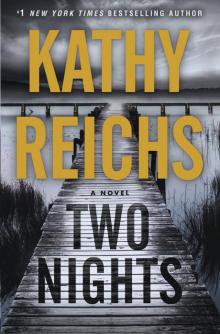 Two Nights
Two Nights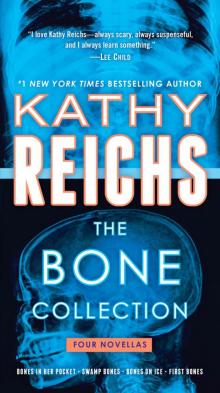 The Bone Collection: Four Novellas
The Bone Collection: Four Novellas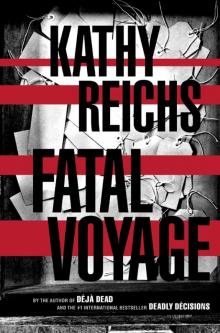 Fatal Voyage
Fatal Voyage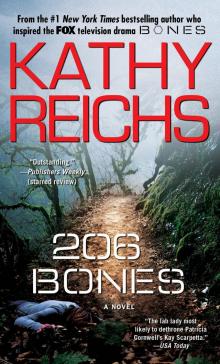 206 Bones
206 Bones Bones to Ashes
Bones to Ashes Terminal
Terminal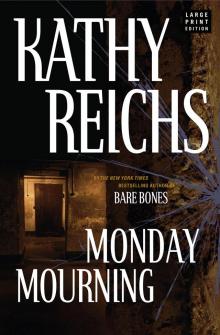 Monday Mourning
Monday Mourning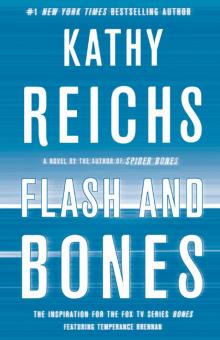 Flash and Bones
Flash and Bones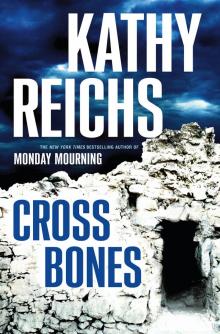 Cross Bones
Cross Bones Devil Bones
Devil Bones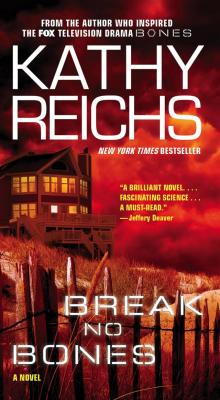 Break No Bones
Break No Bones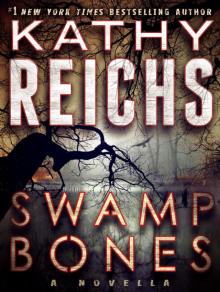 Swamp Bones
Swamp Bones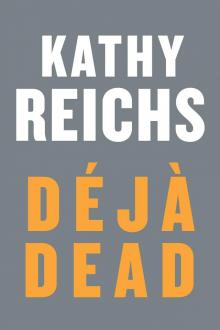 Déjà Dead
Déjà Dead Shock
Shock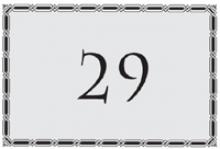 Spider Bones
Spider Bones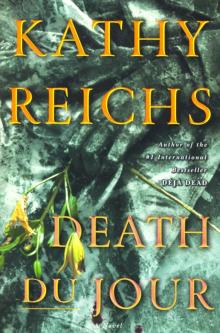 Death Du Jour
Death Du Jour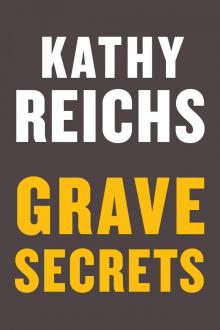 Grave Secrets
Grave Secrets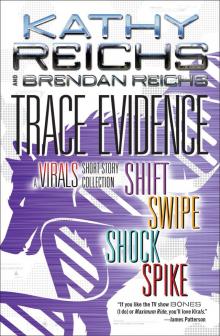 Trace Evidence: A Virals Short Story Collection
Trace Evidence: A Virals Short Story Collection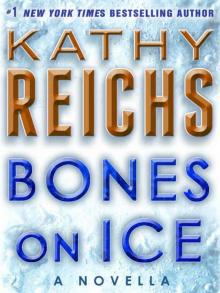 Bones on Ice
Bones on Ice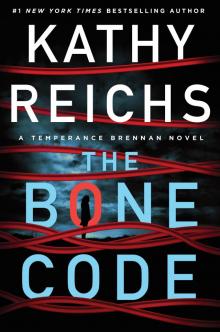 The Bone Code
The Bone Code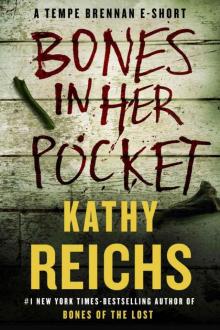 Bones in Her Pocket
Bones in Her Pocket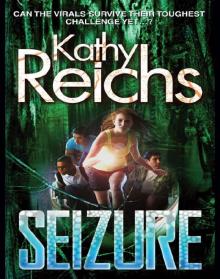 Seizure:
Seizure: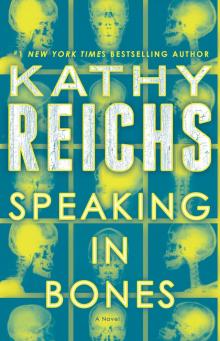 Speaking in Bones
Speaking in Bones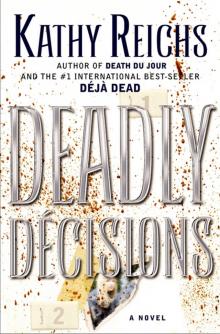 Deadly Decisions
Deadly Decisions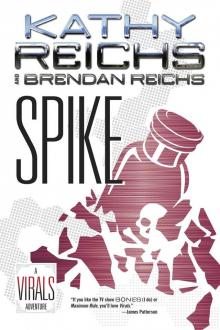 Spike
Spike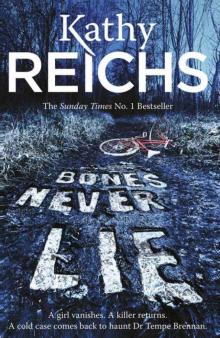 Bones Never Lie
Bones Never Lie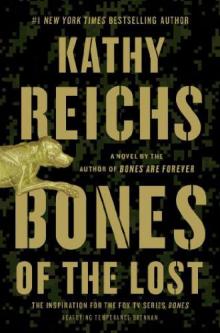 Bones of the Lost
Bones of the Lost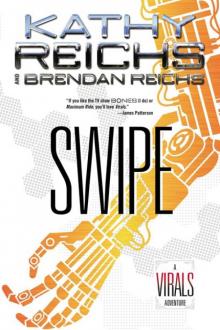 Virals 03.5 - Swipe
Virals 03.5 - Swipe Exposure
Exposure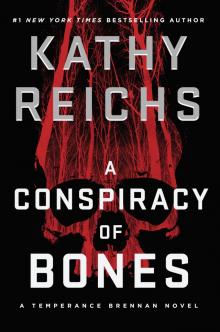 A Conspiracy of Bones
A Conspiracy of Bones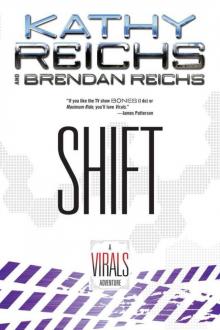 Shift (tory brennan)
Shift (tory brennan)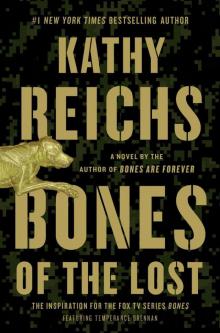 Bones of the Lost: A Temperance Brennan Novel tb-16
Bones of the Lost: A Temperance Brennan Novel tb-16 Virals tb-1
Virals tb-1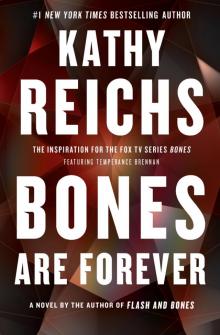 Bones Are Forever tb-15
Bones Are Forever tb-15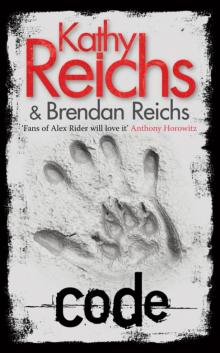 Code tb-3
Code tb-3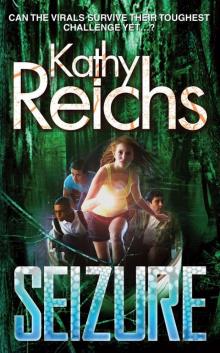 Seizure tb-2
Seizure tb-2 Deadly Descisions
Deadly Descisions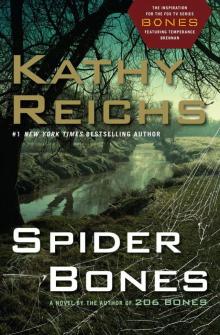 Spider Bones: A Novel
Spider Bones: A Novel